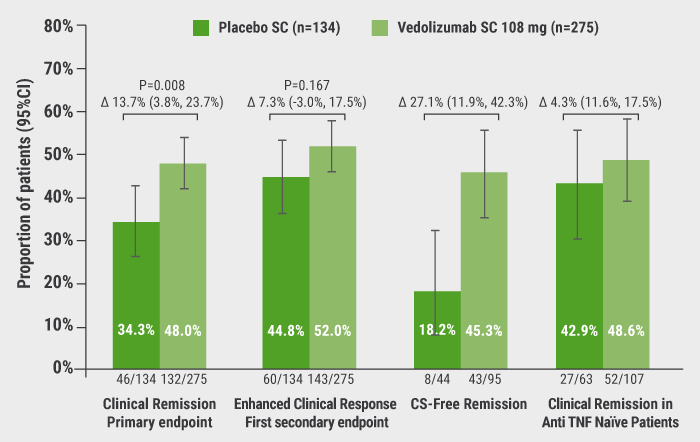By collecting large datasets from countries from all over the world, the IIBDGC unravelled a total of about 240 significant inflammatory bowel disease (IBD)-associated single-nucleotide polymorphisms (SNPs) in multiple large genome-wide association studies (GWAS). This has yielded some 200 IBD loci, Prof. Vermeire explained. The newly identified loci have helped to much better understand the roles of the innate and acquired immune systems in the pathophysiology of IBD.
Prof. Vermeire also highlighted the importance of genetic data on the development of new drugs. She noted that >25% of drugs that enter the clinical development stage fail to reach the market due to inefficacy. Growing insights in disease susceptibility genes may affect selection of drug targets and indications. The proportion of drugs with direct genetic support increases significantly across the development pipeline, from 2% at the preclinical stage to 8.2% for approved drugs. Prof. Vermeire: “Selecting genetically supported targets can double success rate in clinical trials”. She invited any group that wishes to join the IIBDGC consortium to apply. Minimum requirements are high-quality genomic DNA and phenotypic information from a minimum of 500 patients with a confirmed diagnosis of IBD and of 500 population-matched healthy controls. Anyone interested in joining the consortium may contact enquiries@ibdgenetics.org.
Posted on
Previous Article
« Impact of biologicals on faecal microbiota Next Article
Multi-omics help describe CD phenotypes »
« Impact of biologicals on faecal microbiota Next Article
Multi-omics help describe CD phenotypes »
Table of Contents: ECCO 2020
Featured articles
Gut Microbiome as Treatment Target
Response to faecal microbiota transplantation in UC
Bioactives produced by gut bacteria to modulate immune response
Big Data Analysis
Multi-omics help describe CD phenotypes
The positive impact of genetic data on drug development
Experimental Therapies: Study Results
AMT-101: an oral human IL-10 fusion protein
Phase 2 results of first-in-class TL1A inhibitor
Open-label extension study of risankizumab: final results
Clinical remission after dose escalation of upadacitinib
Short- and Long-Term Treatment Results
Infliximab discontinuation increases relapse risk
Tofacitinib ‘real-world’ effectiveness in active UC
Subcutaneous ustekinumab as maintenance therapy in UC
Subcutaneous vedolizumab maintenance therapy in CD
Vedolizumab treatment persistence and safety
Specific Therapeutic Strategies
Impact of strategies on intestinal resection rate
Early ileocaecal resection in CD patients failing conventional treatment
Biologics before surgery in IBD do not elevate infection risk
Top-down infliximab superior to step-up in children with CD
High versus standard adalimumab in active UC
Head-to-Head Comparison of Treatments
Vedolizumab and anti-TNF therapies: a real-world comparison
Cancer Risk
Increased risk of small bowel cancer in IBD
Increased incidence of colorectal cancer and death in CD
Risk of rectal, anal cancer increased in perianal CD
Glyco-fingerprint as risk factor of UC-associated cancer
Miscellaneous Topics
Resolution of mucosal inflammation has dramatic effect
PICaSSO validated in real-life study
Re-inducing inflammation in organoids from UC patients
Role of immune cells in intestinal fibrosis
Association between meat consumption and IBD risk
CD exclusion diet corrects dysbiosis
Related Articles

April 14, 2020
Subcutaneous vedolizumab maintenance therapy in CD
April 14, 2020
Phase 2 results of first-in-class TL1A inhibitor
April 14, 2020
Increased risk of small bowel cancer in IBD
© 2024 Medicom Medical Publishers. All rights reserved. Terms and Conditions | Privacy Policy
HEAD OFFICE
Laarderhoogtweg 25
1101 EB Amsterdam
The Netherlands
T: +31 85 4012 560
E: publishers@medicom-publishers.com

